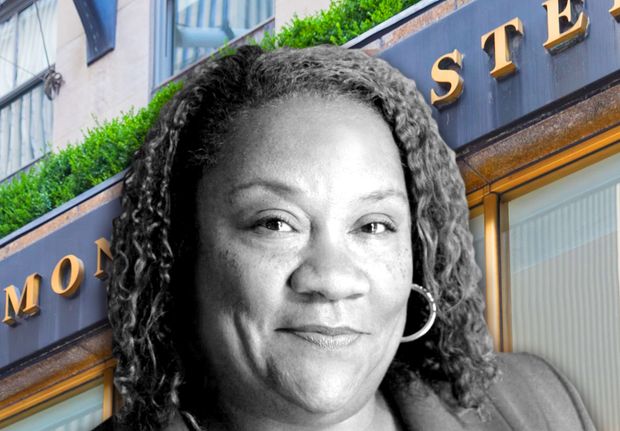
Dana Canedy, publisher at Simon & Schuster, says publishing has an important role to play in the national discussion of racial justice.
MarketWatch photo illustration/Simon & Schuster|iStockphoto
The book-publishing industry has a responsibility to lead as the country grapples with race relations, says new Simon & Schuster publisher Dana Canedy.
Canedy, who began at the company July 27, is the first Black person to occupy the position — one of the most prominent in the business — and the first to head a major publishing imprint.
Publishing, like many other industries, has faced renewed scrutiny in recent months about its lack of diversity in decision-making roles. Industry leaders now say they look forward to a transformed sector that better represents a wide array of authors, stories and ideas.
“I’ve said to the staff that I want this to be the year of innovation,” Canedy said. “I really want people to come with ideas that they’ve been thinking about, but hadn’t brought to the fore yet, or things that they think we should not do or do way more of.”
Canedy takes the reins at a time when Simon & Schuster has released a number of buzzy titles, including “Too Much and Never Enough: How My Family Created the World’s Most Dangerous Man,” by President Trump’s niece Mary Trump, “The Room Where It Happened” by former Trump national security advisor John Bolton, and “Hoax: Donald Trump, Fox News, and the Dangerous Distortion of Truth” by CNN’s Brian Stelter.
The Amazon AMZN, +1.66% best-seller “Rage,” in which Trump divulged to Washington Post journalist Bob Woodward that he knew COVID-19 was “deadly stuff” but “wanted to always play it down,” debuts Tuesday from Simon & Schuster.
Read: Civil-rights attorney Ben Crump on how courts widen — and can narrow — the racial wealth gap
Canedy, 55, was previously the administrator of the Pulitzer Prize; she has also served as a writer and editor at The New York Times, where she herself became a Pulitzer winner in 2001 for her work on the series “How Race is Lived in America.” She is the author of the bestselling 2008 memoir, “A Journal for Jordan,” which draws from the writings her fiancé left behind for their then-infant son before he was killed in combat while serving in Iraq. A movie based on the book, starring “Black Panther” actor Michael B. Jordan and directed by Denzel Washington, is slated to begin production this fall.
MarketWatch spoke with Canedy for The Value Gap as she was jumping into the role remotely, like so many other workers across the country.
“Ordinarily, starting a job like this, I’d love to take people to lunch or dinner or for coffee,” she said. “So I’ve been having meetings ‘in their homes.’ We have coffee together or lunch together or dinner together as we talk.”
Canedy addressed the diversity gap not just in publishing, but in journalism as well. The newly minted publisher isn’t just interested in racial diversity, but diversity of all kinds.
MarketWatch: It’s early on, but what are some of your top goals?
Canedy: There are so many areas of interest that are really important for the publishing industry right now to be focusing and honing in on. There’s a lot to say about the pandemic, for example, in politics and race relations in this country.
But I also think I’d like to see more books from the Midwest telling stories from their military families. Most people in America don’t even know folks in the military. I come from a military family. My book had a military component. And so I’d like to tell more of those stories. And I think there’s a market and audience for that.
“ ‘Diversity is a huge focus. Diversity of all kinds: diversity in the voices we amplify, the books we acquire, the subject matter we go after, and also in staffing.’ ”
I think there’s a lot to say on religion. If Trump doesn’t win the election, I think that this country will be engaged, again, in a very aggressive way on climate [change] and there will be things to say. So there’s a lot to do; a lot of material to mine.
Diversity is a huge focus. Diversity of all kinds: diversity in the voices we amplify, the books we acquire, the subject matter we go after, and also in staffing — who we systematically look to retain and promote, and bringing new folks into the company.
MarketWatch: What have we been missing out on because there hasn’t been more diversity?
Canedy: It’s the same thing that every industry is missing out on. It’s not unique to publishing. Different perspectives aren’t about social experiments. It’s good for business.
If you have more people in the room at a news organization, for example, that don’t all look alike, you’re going to get different perspectives on your reporting.
If you’re in the consumer products business, having a diverse staff means that you’re going to tap into markets that might have been ignored or overlooked.
You miss out on really maximizing your business in all areas at all levels if you don’t have diversity. You are not performing at your best as a company if you don’t have diverse staff and diverse leadership.
MarketWatch: What have people been reading during COVID? James Baldwin is on top of the bestseller list again.
Canedy: It’s funny you mention it, because it’s all over the map. Simon & Schuster is having one of its best years in its history. People are at home; you can only watch so much Netflix NFLX, -0.14%. They’re reading more; they’re engaged more. I think they’re being more cerebral because we’ve had to all settle down and it’s given us a lot of time to just sit still and think.
And then we have so many huge stories going on at once and huge things going on in our culture, whether it’s race or the pandemic or politics. …People are really engaged in those subjects, and that’s going to continue. It offers a huge opportunity for publishing and for journalism.
In terms of publishing, I hope people sit down with a hard copy of a book. But as long as they’re reading us, if they want to read us on a tablet, if they want to listen to us, that’s fine.
“ ‘There’s a racial reckoning going on. And the publishing industry has an opportunity — I would say responsibility — to lead in that conversation. And you can do that through books.’ ”
I was walking on the Jersey Shore the other day. I saw in a bookstore, they had three windows displaying books they want to promote. Every single one of them were books about race.
There’s a racial reckoning going on. And the publishing industry has an opportunity — I would say responsibility — to lead in that conversation. And you can do that through books.
MarketWatch: One issue that has been prominent in the news media for some time now is that we’re only seeing one type of story, or stories from some regions, or on some issues. What is the media missing out on when there’s a lack of diversity?
Canedy: If you think about diversity in the broadest sense, the media tends to miss things in cycles. The Black Lives Matter movement, obviously, was something that they missed in terms of this [post-George Floyd] racial reckoning that is happening. I think it took everybody by surprise inside and outside the media.
But I would argue that before that, they missed the story of Trump and what many working-class white Americans were feeling. It is the responsibility of the media to understand all kinds of audiences. They tend to miss things because much of the media is centered in the Northeast. Because of the financial crunch in the industry, there aren’t a lot of news organizations that have bureaus throughout the country anymore. And so you miss stories just by not being out in those communities.
And not just about diversity, but in general. The issues that are affecting people that may be regional, if you don’t have reporters traveling the country and of course, it’s even harder now because nobody can get on an airplane and go out into the world. So I think missing stories is going to continue for a while just because people are literally physically isolated.
“ ‘The story has to be authentic. It has to be thoroughly and completely researched, even if it’s a personal story, and told in a compelling way. There are sophisticated readers in this country. If you don’t have that, you will lose them.’ ”
But again, this is where having a diverse staff helps you. Because if you can’t send your reporters, for example, out into the Midwest, if you have reporters on your staff who are from the Midwest, they’re going to bring their point of view into your news meetings. Or if [some of] your reporters are afraid to go to Harlem or to the Bronx, it helps you to have staff members who are diverse, who are absolutely fine going into those communities and hearing stories.
MarketWatch: There’s also a crisis of local media, with more than 50 local newsrooms shutting down, leaving many without a news outlet focused on the issues impacting their community. Do you have any thoughts about what journalism will look like in the future?
Canedy: I think that you’re going to find more funding of journalism through foundations, for example, and through collaborations with places like ProPublica so that news organizations are able to combine resources. That’s going to be increasingly important to local markets. And so I think you’ll see more partnerships between competing news organizations.
MarketWatch: Does that improve things?
Canedy: It certainly improves things, because otherwise many of the stories wouldn’t get told. And many of these news organizations would be out of business, meaning those journalists wouldn’t be working.
The beauty of collaboration is that rather than just parachuting someone into a town for a small amount of time, and then bringing them out and having them try to write authoritatively about a local issue, they’re teaming up with people who actually live in these communities and have sources in these communities. So I do see it as positive.
And even if there are some downsides to that, which I can’t think of at the moment, it’s a matter of life and death for some of these news organizations — particularly with their most ambitious work, which requires allowing somebody to take a month or three months or longer off of their beats. Organizations can’t do that unless they partner with somebody like ProPublica. Getting funding from the Knight Foundation is hugely important to local news. They give away millions and millions of dollars every year to support local news.
And so those are the things that give us in the journalism industry (I still consider myself a journalist, so I still say “us”) the best possibility for local news organizations being able to sustain themselves.
MarketWatch: As a leader in book publishing now, how do you feel about Amazon? Is it a good thing for publishing? Is that a bad thing?
Canedy: We should be rethinking everything, in keeping with my same idea of innovation. We sell a heck of a lot of books on Amazon, and Amazon is our friend. That’s my initial response.
I need to spend a little more time inside the industry and really understand financially where we are with Amazon — the ways that Simon & Schuster, and the publishing industry in general, benefit from the relationship with Amazon and the ways that maybe it doesn’t.
MarketWatch: You’ve been involved in so many different areas of publishing at this point. What is the thread that brings them all together?
Canedy: Good storytelling that’s provocative and making you think about something in a different way. The story has to be authentic. It has to be thoroughly and completely researched, even if it’s a personal story, and told in a compelling way. There are sophisticated readers in this country. If you don’t have that, you will lose them.





